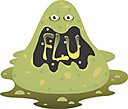- Akron Central Schools
- Health Tips
- Influenza (flu)
Health Office
Page Navigation
-

HELPFUL FACTS ABOUT INFLUENZA (FLU)
With the flu season already upon us, here are some important facts from the CDC (Centers for Disease Control) on influenza and how to stay healthy. This is intended as a guideline and therefore any questions or clarification should be directed toward your primary-care provider.What is Influenza?
The flu is a contagious respiratory illness caused by influenza viruses. It can cause mild to severe illness, and at times can lead to death. The best way to prevent getting this illness is by getting a flu vaccine each year.
Symptoms of Flu:
Symptoms of flu include:- fever (usually high)
- runny or stuffy nose
- headache
- muscle aches
- stomach symptoms, such as nausea, vomiting, and diarrhea, also can occur but are more common in children than adults.
- extreme tiredness
- dry cough
- sore throat
Complications of the flu:Complications of the flu can include pneumonia, dehydration, and worsening of chronic medical conditions, such as congestive heart failure, asthma, or diabetes. Children may get sinus problems and ear infections.
How Flu SpreadsFlu viruses spread in respiratory droplets caused by coughing and sneezing. They usually spread from person to person, though sometimes people become infected by touching something with flu viruses on it and touching their mouth or nose. Most healthy adults may be able to infect others beginning 1 day before symptoms develop and up to 5 days after becoming sick. That means that you can pass on the flu to someone else before you know you are sick, as well as while you are sick.
Simple steps to keep you and others healthy:- Clean your hands often. Children should be reminded to wash with soap and water especially after they cough or sneeze. If water is not near, use an alcohol-based hand cleaner.
- Cover your mouth and nose with a tissue when coughing or sneezing. Remind children to throw the tissue away after they use it.
- Avoid touching your eyes, nose or mouth as much as possible. Germs often spread this way.
- Stay away from people who are sick.
- Get regular exercise, enough rest and eat healthy balanced meals.
- Take a flu break. Since the flu can make some people very sick or even cause death, everyone should stay home and see a doctor when they get sick.
- Get the flu shot. It is the best way to protect against getting the flu.
When to Get Vaccinated:
October or November is the best time to get vaccinated, but getting vaccinated in December or even later can still be beneficial. Flu season can begin as early as October and last as late as May.Who Should Get Vaccinated?
In general, anyone who wants to reduce their risk of getting the flu can get vaccinated. However, certain people should get vaccinated each year. They are the people at high risk of having serious flu complications or people who live with or care for those people at high risk for serious complications.Who Should NOT Be Vaccinated?
Some people should not be vaccinated without first consulting a physician. They include:- People who have a severe allergy to chicken eggs.
- People who have had a severe reaction to an influenza vaccination in the past.
- People who developed Guillain Barre syndrome within 6 weeks of getting an influenza vaccine previously.
- Children less than 6 months of age (influenza vaccine is not approved for use with this age group).
- People who have a moderate or severe illness with a fever should wait to get vaccinated until their symptoms lessen.
If you have questions about whether you should get a flu vaccine, consult your health-care provider.

